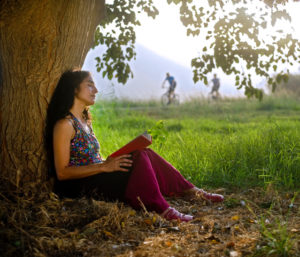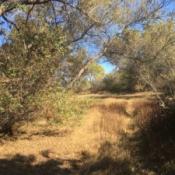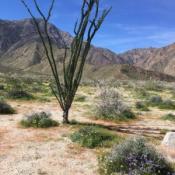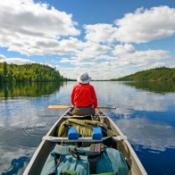 “I only went out for a walk, and finally concluded to stay out ‘till sundown, for going out, I found, was really going in.” —John Muir
“I only went out for a walk, and finally concluded to stay out ‘till sundown, for going out, I found, was really going in.” —John Muir
“Are we not bonded to this planet by something that is life affirming?” —Theodore Roszak
No matter how old I get, I still really want to save the world.
I feel this desire emanating from deep down in my core. I’ve had it for as long as I can remember. No matter the inconvenience or discomfort it may cause me, I just don’t seem to be able to turn it off.
When I was a little kid, maybe around 5 or 6 years old, I would daydream about founding an organization. I called it the “World Improvement Society.” At the time, I was fortunate enough to be pretty vague on the world’s actual problems. I remember imagining what the WIS headquarters would look like, with stately desks and long tables, which we would sit around during our important meetings and discussions. I pictured us feeding little old ladies (whether or not they actually needed it—I’m not certain) and helping people clean up their cluttered, overgrown backyards.
Usually, this memory of uninformed but pure-hearted childhood innocence brings a smile to my now-aging face. At the moment, however, my heart feels heavy. Curled up on my couch with my sweet little rescue dog warm beside me, I can’t stop thinking about what I just read. A chapter in my naturalist handbook describes humans’ energy use—and how it has harmed our ecosystems and climate. This widespread and multilayered damage threatens the balance that all life on earth depends on, including us. The summary in the handbook is devastating and unrelenting.
Seeking to escape the horror for a moment, I make the mistake of browsing online, looking for something cute, funny, or otherwise comforting. Instead, I find out that 15,000 scientists from hundreds of countries have united to sign a letter. Their letter warns that “humanity is not taking the urgent steps needed to safeguard our imperiled biosphere.” The writers detail various areas of human-caused devastation, including overpopulation, ecosystem destruction, economies rooted in growth, pollution, and invasive species.
Oh, my goodness. We are in trouble.
Looking at the overview of it all, I feel stunned, heavy, and anxious. My heart hurts.
Anxiety and grief are widespread reactions to our advancing environmental devastation. For the most part, though, psychotherapeutic treatment focuses on factors within people and families. My social work background brings in socioeconomics and culture, but traditional psychology and psychotherapy usually prefer to leave wider-scale problems to the sociologists and political analysts. Furthermore, our environmental problems are so multifaceted and vast—and so ferociously defended by some who benefit from the status quo—people may feel as though it wouldn’t do any good to even mention their eco-anxiety. In the therapy room, “Despair remains an unacknowledged hot potato” (Rust, 2013, p. 42).
On a day-to-day basis, it’s “business as usual” and we remain disconnected from that which seems too stressful and unmanageable. And yet there it is, buzzing along in the background of our awareness, like a nest of angry hornets temporarily subdued under a blanket. Nature, a source of deep comfort and happiness for so many, is being destroyed every day, and this destruction threatens the future of life on earth as we know it. “Our responses to what is happening to our world need airing and unpacking as much as any feelings about human relationships” (Rust, p. 41).
Perhaps worse, many of our own habits—the things we do on a daily basis, learned from and supported by the mainstream culture—are quite damaging to these beautiful ecosystems we depend on. And deep down, we know it. Stuck as we are in the need to function on a daily basis, this creates uneasiness and guilt that many of us feel we can’t really do much about. Again, faced with this unsolvable bind, repression of the problem often seems the only solution.
Consider the following examples:
- Mary Jayne Rust writes of a person in therapy who had seemingly lost herself in a fog of hedonism, including heavy drinking and drug use. When the therapist inquired about the person’s feelings about the future, she said this behavior was due to the sense of hopelessness and despair she and her boyfriend felt about environmental destruction: “Why not drink and do drugs? There’s no future. We might as well go out having a party” (p. 42).
- Immediately after last year’s U.S. election cycle, I received some people into my practice due to their anxiety and despair about the policies of the incoming administration, and the plight of animals and their natural environment. One told me, “We’re totally screwed, and I need to get myself unstuck.”
- If you are a parent and/or grandparent, please pause here and take a moment to reflect on the state of the world, however you envision it. Imagine your children and grandchildren inheriting this world and making efforts to survive in it. What thoughts and feelings come up for you? How do you respond to these thoughts and feelings?
- A man, stressed by the demands of daily life and the need to survive, becomes angry and despairing. Perhaps he has some homeowner’s insurance (or perhaps not). He takes action to first deface and then burn his own house down. The fire kills his pets, and the air pollution and destruction impact his entire town. If he goes to a forensic jail, what might his diagnosis be? What if we change the word “house” to “environment”?
- In reflecting on this vast splitting from the very environment that supports us, Rust comments, “I felt as if I were a therapist on the Titanic. We might be doing fine work in the therapy room, but nobody was mentioning the sinking of the ship” (p. 39).
Ecotherapy is a worldwide movement within the healing arts. It includes a broader, more inclusive way of looking at the reciprocal effects between human and environment. Ecotherapy encourages us to heal our relationship with (and our obvious splitting from) the natural environment that sustains us with every breath we take. Personally, I love the elegant economy of ecotherapy interventions. With one set of actions, it is possible to affect healing across multiple levels.
Ecotherapy encourages us to heal our relationship with (and our obvious splitting from) the natural environment that sustains us with every breath we take.
Imagine someone who comes to therapy for depression and anxiety. In the therapy, they connect with their love of nature, which deeply supports them, and with their despair for their children’s future. They decide to work with some habitat restoration effort or volunteer in a wildlife rehabilitation center. They are actively creating healing: from the smallest microbes in the soil, all up through the ecosystem, in the plants and animals supported by such restoration, and also in themselves, as they are turning their despair into helpful action. Because humans are social creatures, their newfound sense of efficacy and well-being tends to positively impact those around them. Certainly, the neighborhood and community benefit as well.
The 15,000 scientists who signed that warning letter offer some comfort and encouragement: “With a groundswell of organized grassroots efforts, dogged opposition can be overcome and political leaders compelled to do the right thing. It is also time to reexamine and challenge our individual behaviors” (p. 3).
The ecotherapy movement is quite timely, as our profound worldwide levels of anxiety, compulsion, conflict, and other neuroses are outdone only by our mass homicidal/suicidal behavior: the short-sighted destruction of the ecosystems that support all life on earth. In order to better serve individuals in therapy and also deal with the proverbial “elephant in the room,” many ecotherapists feel that the fate of our natural environment is one variable we can no longer afford to ignore in the clinical rooms.
References:
- Buzzell, L., & Chalquist, C. (Ed,s) (2009). Ecotherapy: Healing with nature in mind. San Francisco: Sierra Club Books.
- deNevers, G., Stanger, D., & Merenlender, A. (2013). The California naturalist handbook. Berkeley: University of California Press.
- Ripple, W.J., Wolf, C., Newsome, T., Galetti, M., Alamgir, M., Crist, E., Mahmoud, M., & Laurence, W. (2017). World Scientists’ Warning to Humanity: A Second Notice. Retrieved from https://academic.oup.com/bioscience/article/doi/10.1093/biosci/bix125/4605229.
- Robinson, L. (2009). Psychotherapy as if the world mattered. In Buzzell, L., & Chalquist, C. (Eds.) (2009). Ecotherapy: Healing with nature in mind. San Francisco: Sierra Club Books.
- Rust, M.J. (2009). Why and how do therapists become ecotherapists? In Buzzell, L., & Chalquist, C. (Eds.) (2009). Ecotherapy: Healing with nature in mind. San Francisco: Sierra Club Books.
© Copyright 2017 GoodTherapy.org. All rights reserved.
The preceding article was solely written by the author named above. Any views and opinions expressed are not necessarily shared by GoodTherapy.org. Questions or concerns about the preceding article can be directed to the author or posted as a comment below.

 Finding Green Amid the Urban Gray: Lessons from an Hour in Nature
Finding Green Amid the Urban Gray: Lessons from an Hour in Nature Of Wildflowers and Worries: Living in an Age of Eco-Anxiety
Of Wildflowers and Worries: Living in an Age of Eco-Anxiety 5 Ways Nature Can Help You Feel Better
5 Ways Nature Can Help You Feel Better